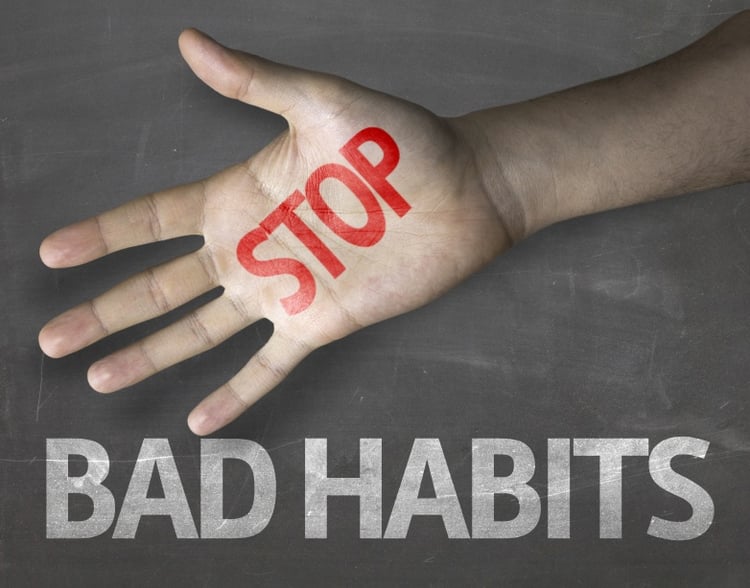 In an industry where sales can make or break your business, it's important that you (or your sales team) have good sales habits. However, there's more to it than just having good habits, it's about breaking bad sales habits, too. In this post we’re going to discuss how to break bad sales habits so you can improve your bottom line.
In an industry where sales can make or break your business, it's important that you (or your sales team) have good sales habits. However, there's more to it than just having good habits, it's about breaking bad sales habits, too. In this post we’re going to discuss how to break bad sales habits so you can improve your bottom line.
Bad Habit: Poor Follow up or Not Following up at All
Why: Follow-up is key to nurturing leads and retargeting customers. Failing to follow up or not following up meaningfully is a signal to the customer, that the brand doesn't care about having their business or meeting their needs. It's dropping the ball, and it's probably losing a number of sales. Meanwhile, maintaining that connection presents a number of opportunities to show the way your brand offers solutions that are worth their time and money.
How to fix it: At the very least, there needs to be a strategy in place that makes follow up a habit. However, there's a number of tools to help either automate follow up or remind all employees involved with closing the sale of the role they need to play in reaching out to leads, such as CRM software.
Bad Habit: Staying "Busy"
Why: Being busy is not the same as being productive, and it's even less connected to closing the sale. Being busy takes up time, sometimes it even takes up resources, but doesn't offer much in return, and unfortunately, it can be blanketed in the perception of doing your job. Things like checking your email — yes, even work-only email — engaging with staff, and spending too much time on phone calls that could be much briefer all eat time that need to be spent doing something else.
How to fix it: This is going to depend on what role you play in the sales process and the tools you need to complete that work. However, you should be able to develop a list of tasks and goals. If the task doesn't work toward a sales goal, it's busywork.
Bad Habit: Staying Inside Your Sales Comfort Zone
Why: Staying inside a sales comfort zone will, at best, maintain your status quo. It's a plateau, and it inhibits growth not only of the sales person but of the brand overall. Worse, if a new product or service doesn't apply to the prospects inside that comfort zone, it could lead to a drop in sales.
How to fix it: Sales is all about offering customers solutions, so to stretch beyond your comfort zone — especially if you need help identifying that audience — you need to start by examining the problem that your product or service solves. That means doing your homework and being observant, and most of all, being willing to take some risk. Recognize that opportunities will be where you're not used to looking.
Bad Habit: Not Qualifying Leads Appropriately
Why: This is the same concept for segmenting and qualifying audiences in marketing — if you don't have a way to distinguish between a valuable prospect — that is, one that's likely to buy, vs. one that's definitely not a buyer — then you can end up wasting a lot of time and money by trying to sell your brand to someone that's never going to convert. Alternatively, if your research is weak and incomplete, you might end up missing a great customer because you’ve assumed they wouldn't be a buyer.
How to fix it: Hone your sales skills and learn to ask the right questions, to unearth the right information, and to listen to what the potential customer is saying, as well as what they're not saying. There's no quick fix for learning to make every potential customer feel valuable while weeding out the people who won't ever really be customers.
Bad Habit: Not Properly Preparing Yourself
Why: In terms of sales, being unprepared can be fatal. You don't know enough about the customer you're trying to reach, about the customer in front of you, or about the products, services, and current offers that your brand is running. The less you know, the less confident and convincing you're likely to be. The more you wing it, the more often you'll end up with the same answer from customers: "I need to think about it."
How to fix it: Pay attention to what marketing has to say about the products and services being sold. Departments shouldn't be nearly as siloed as they've been in the past, however, marketing gets involved at a different stage of development and is constantly doing the footwork to reach out to the right customers in the right way with the right information. Take advantage of this. Another tactic is to make preparing yourself a habit and part of your regular routine, helping you to avoid winging it through role play and dress rehearsals. (This may also be a great tool for team building!)
Bad Habit: Talking Too Much and Not Listening Enough
Why: One sided conversations do nothing to convince a customer you have their needs and best interests in mind, undermining not only the sale, but the way they perceive your brand overall. If it moves forward into a sale, it could end out with an extremely unhappy customer, which puts your reputation at risk. This can also further snowball into selling a product instead of a solution.
How to fix it: Start listening actively. Ask questions and engage the customer so that they feel like you (and thus the brand) care about what they have to say and what they're looking for. All the research in the world can't measure up against to simply listening to the customer talk about their situation.
Bad Habit: Not Understanding the Customer's Needs
Why: This is a step beyond not listening. An otherwise great sales rep can lose a sale because they failed to comprehend what the customer actually needed. For instance, if the rep approached someone with the newest product or service, or with the flagship product or service, but that's not what the customer was interested in or what they needed. The rep listened to the cues that said they shouldn't push about these products, but they missed what the customer was actually asking for. Alternately, this can snowball into the customer taking control of the sale, which might sound like a good thing on the surface, but really it means that the sales process is derailed to the point it may never be closed for either the brand or the customer.
How to fix it: Be on the lookout for the right information. This is taking active listening to the next level, but it also relies on you being prepared. For instance, tracking customer profiles and sales performance through a CRM can help you identify the data to help identify similar needs that you have solutions for. From that point, you need to nurture that lead according to your tried and true sales process to closing.
Bad Habit: Being Pushy
Why: Selling is hard, and becoming that stereotypical salesperson — the all-too familiar one is the caricature of a used-car salesman, always pushing and always obnoxious — seems like it's always a risk. Customers want you to give them a solution, but they don't want to be sold to, and the more pressure that's applied, the less comfortable they are with making a decision. Even if they do make the decision, they aren't going to be happy or comfortable with having made it.
How to fix it: Take the lessons mentioned in our previous points and apply them towards being a compassionate salesperson that listens to what a customer needs and genuinely tries to find the right solution for them. Rather than pushing a product, present the solution you offer in a realistic and applicable way. Make them feel comfortable — with you, with the brand, and with the decision to say yes.
Of course, breaking bad sales habits like these is only the beginning, so be sure you cultivate space and time for finding other bad habits and learning to eliminate them. Our tips for how to break bad sales habits should make a good starting point for launching a focus of continuous improvement. The better you and your sales team are, the more you can improve your bottom line and keep customers coming back for more.




